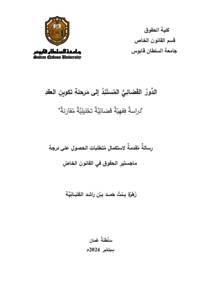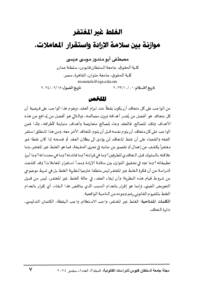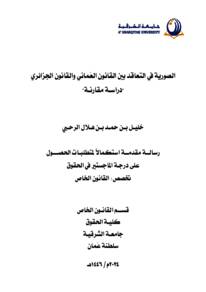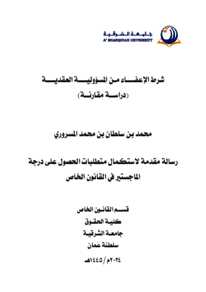وثيقة
الدور القضائي المستند إلى مرحلة تكوين العقد : دراسة فقهية قضائية تحليلية مقارنة.
المصدر
رسالة ماجستير
عناوين أخرى
The judicial role based on the stage of contract formation : (a comparative analytical jurisprudential study)
الدولة
عمان
مكان النشر
مسقط
الناشر
جامعة السلطان قابوس
ميلادي
2024
اللغة
العربية
الموضوع
نوع الرسالة الجامعية
رسالة ماجستير
الملخص الإنجليزي
This study came to reveal the role of the judge based on the stage of
contract formation in Omani legislation, and the extent to which this role is
compatible or different with the principle of the authority of the will and the
binding force of the contract. In addition, the study revealed that the judge has
a positive role from an objective standpoint that is no less important than his
role from a procedural standpoint. An objective, positive role whose
manifestations are many and whose degrees vary, and whose goal is focused
on balancing between the soundness of the will establishing the contract on the
one hand, and the stability of transactions and the contract remaining fulfilling
its economic and social function on the other hand. The study divided into two
chapters: In the first, the role of the judge was addressed in verifying the
"existence of the contract" and its elements and preventing its demise.
Moreover, in the second chapter, the role of the judge was shown in
investigating the common will of "the contracting parties" (when interpreting,
adapting, transforming, derogating, and amending the contract). I have defined
the scope of this role to be based on a contemporary circumstance of contract
formation.
Primary, the researcher used the comparative analytical approach that
based on analyzing legislative texts, judicial rulings, and jurisprudential
treatments related to the subject of the research and comparing between the
Egyptian law and Omani law. Therefore, this study concluded several results
such as, the most prominent of which is that although the Omani legislator
allowed the judge to intervene in the contract, this was not in accordance with
explicit texts that carefully regulated this authority. In addition, this study
shown that the Omani judiciary system is fearful of the exercise of activities on
this role.
Lastly, this study came up with several recommendations as the most
prominent of which is the necessity of stipulating a mistake forgiveness officer
for requesting annulment of the contract. Also, it shown another text regulating
the judge’s authority to adapt the contract, and amending the texts regulating
the mechanisms for transforming and derogating the contract. To keep in mind,
it is also necessary for the judiciary to realize the importance of this role and
seek to activate it.
الملخص العربي
جاءت هذه الدراسة لتميط اللثام عن دور القاضي المستند لمرحلة تكوين العقد في التشريع العماني، ومدى توافق هذا الدور أو اختلافه مع مبدأ سلطان الإرادة والقوة الملزمة للعقد. وقد كشفت الدراسة عن أن للقاضي دوراً إيجابياً من الناحية الموضوعية لا يقل عن دوره من الناحية الإجرائية. دور إيجابي موضوعي تتعدد مظاهره وتتفاوت درجاته، وينصب هدفه على الموازنة بين سلامة الإرادة المؤسسة للعقد من جهة، واستقرار المعاملات وبقاء العقد مؤدياً لوظيفته الاقتصادية والاجتماعية من جهة أخرى. وقد قسمت الدراسة إلى فصلين: تناول الفصل الأول دور القاضي في التحقق من "وجود العقد" وأركانه ومنع زواله.
علاوة على ذلك، في الفصل الثاني، تم توضيح دور القاضي في تحري الإرادة المشتركة لـ "أطراف العقد" (عند تفسير العقد، وتكييفه، وتحويله، وإلغاءه، وتعديله). وقد حددنا نطاق هذا الدور على أساس الظروف المعاصرة لتكوين العقد.
علاوة على ذلك، في الفصل الثاني، تم توضيح دور القاضي في تحري الإرادة المشتركة لـ "أطراف العقد" (عند تفسير العقد، وتكييفه، وتحويله، وإلغاءه، وتعديله). وقد حددنا نطاق هذا الدور على أساس الظروف المعاصرة لتكوين العقد.
قالب العنصر
الرسائل والأطروحات الجامعية




